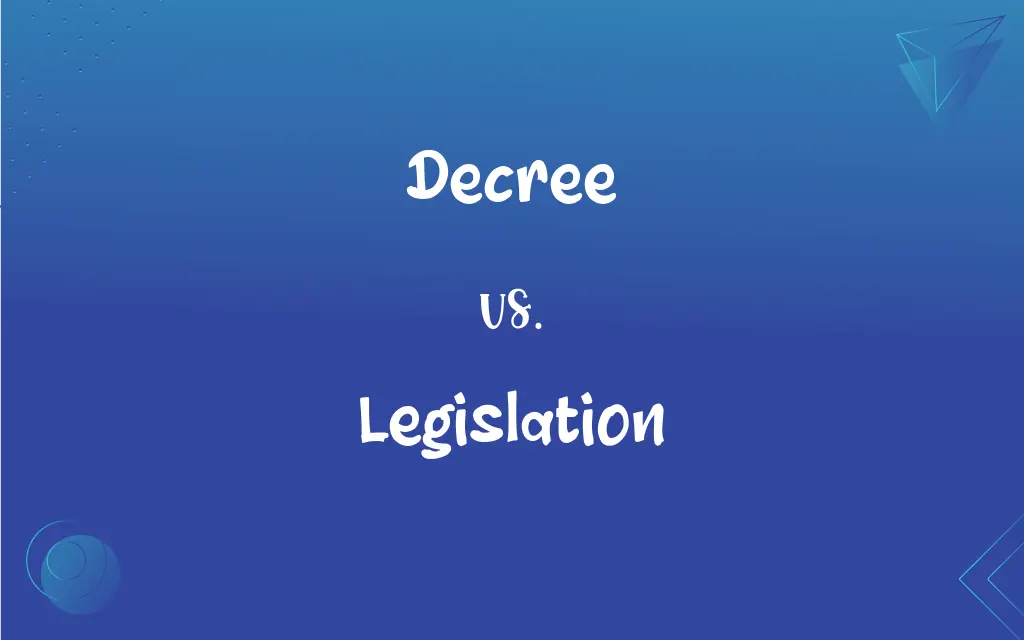Decree vs. Legislation: What's the Difference?
Edited by Harlon Moss || By Janet White || Published on November 6, 2023
A Decree is an official order issued by an authority, while Legislation refers to laws made by a governing body.

Key Differences
A Decree is typically an official directive or proclamation made by someone in power, such as a ruler, president, or judge. It can be viewed as an immediate and authoritative decision, often made to address a specific situation. Legislation, on the other hand, involves a systematic process of proposing, drafting, debating, and enacting laws, often within a legislative body like a parliament or congress.
Decrees might be used in various contexts, from monarchs issuing royal decrees to judges rendering judicial decisions. They often don't undergo an extensive process of discussion or debate, unlike Legislation, which usually involves multiple readings, committees, and stages before becoming law. The primary difference is the immediacy and individual authority behind a Decree, contrasted with the collective, deliberative process of Legislation.
Legislation is a cornerstone of democratic societies, allowing elected representatives to create, amend, or repeal laws on behalf of their constituents. It is grounded in a structured system, ensuring that multiple perspectives are considered. A Decree, in some instances, might bypass this democratic process, originating from a single authority figure and being executed without a broader consultative procedure.
However, both Decrees and Legislation serve to regulate, command, or govern behaviors and actions within a society. While they derive their authority from different sources and processes, their ultimate goal is to provide direction, clarity, and order to citizens and institutions.
Comparison Chart
Origin
Issued by an individual authority.
Formed by a collective governing body.
ADVERTISEMENT
Process
Often immediate, without broad consultation.
Deliberative, involving multiple stages of discussion and approval.
Typical Issuers
Monarchs, presidents, judges.
Parliaments, congresses, assemblies.
Flexibility
Can be more responsive to specific situations.
Generally more structured and systematic.
Democratic Involvement
Might bypass democratic processes.
Central to democratic governance, involving elected representatives.
Decree and Legislation Definitions
Decree
An official order issued by a legal authority.
The king issued a Decree forbidding public gatherings.
ADVERTISEMENT
Legislation
A law or set of laws proposed or enacted.
The recent Legislation on healthcare sparked national debate.
Decree
A decision of a court or tribunal.
The judge's Decree finalized the divorce proceedings.
Legislation
Laws considered collectively.
The new Legislation focused on environmental protections.
Decree
An edict or law made by a ruler.
The emperor's Decree changed the course of the empire's history.
Legislation
The act or process of making laws.
The committee is involved in the Legislation of new tax policies.
Decree
A formal and authoritative order.
The council's Decree mandated recycling throughout the city.
Legislation
The body of laws in a particular jurisdiction.
International Legislation can be complex and varied.
Decree
An authoritative order having the force of law.
Legislation
The exercise of the power and function of making laws.
Legislation requires careful consideration and debate.
Decree
The judgment of a court of equity.
Legislation
The act or process of legislating; lawmaking.
Decree
The judgment of a court.
Legislation
A proposed or enacted law or group of laws.
Decree
A doctrinal or disciplinary act of an ecclesiastical authority.
Legislation
The act of legislating; preparation and enactment of laws.
Pass legislation
There is a lack of legislation about human cloning.
Decree
An administrative act applying or interpreting articles of canon law.
Legislation
Law which has been enacted by legislature or other governing body
Decree
To order, establish, or decide by decree
Decreed that the two kingdoms would be united.
Legislation
The act of legislating; preparation and enactment of laws; the laws enacted.
Pythagoras joined legislation to his philosophy.
Decree
To issue a decree.
Legislation
Law enacted by a legislative body
Decree
An edict or law.
Legislation
The act of making or enacting laws
Decree
(legal) The judicial decision in a litigated cause rendered by a court of equity.
Decree
(legal) The determination of a cause in a court of admiralty or court of probate.
Decree
(religion) A predetermination made by God; an act of providence.
Decree
To command by a decree.
A court decrees a restoration of property.
Decree
An order from one having authority, deciding what is to be done by a subordinate; also, a determination by one having power, deciding what is to be done or to take place; edict, law; authoritative ru decision.
There went out a decree from Cæsar Augustus that all the world should be taxed.
Poor hand, why quiverest thou at this decree?
Decree
A decision, order, or sentence, given in a cause by a court of equity or admiralty.
Decree
An edict or law made by a council for regulating any business within their jurisdiction; as, the decrees of ecclesiastical councils.
Decree
To determine judicially by authority, or by decree; to constitute by edict; to appoint by decree or law; to determine; to order; to ordain; as, a court decrees a restoration of property.
Thou shalt also decree a thing, and it shall be established unto thee.
Decree
To ordain by fate.
Decree
To make decrees; - used absolutely.
Father eternal! thine is to decree;Mine, both in heaven and earth to do thy will.
Decree
A legally binding command or decision entered on the court record (as if issued by a court or judge);
A friend in New Mexico said that the order caused no trouble out there
Decree
Issue a decree;
The King only can decree
Decree
Decide with authority;
The King decreed that all first-born males should be killed
Decree
A binding decision or proclamation.
The Decree of the committee set new guidelines for the event.
FAQs
Who can propose Legislation?
In democratic societies, elected representatives typically propose Legislation.
Is a Decree always permanent?
No, a Decree can be temporary or permanent, depending on the issuing authority's intent.
Can a Decree override existing laws?
Depending on the jurisdiction, a Decree might override certain laws, especially if issued during emergencies.
Is every Decree legally binding?
Generally, yes, but its binding nature depends on the authority and legal framework of the jurisdiction.
What's the main goal of Legislation?
The goal of Legislation is to create, amend, or repeal laws in the best interest of the public.
Can citizens influence a Decree?
While Decrees are top-down, public opinion or pressure can sometimes influence their issuance or content.
How is Legislation enforced?
Legislation is enforced by relevant governmental agencies and the judicial system.
How can citizens influence Legislation?
Citizens can vote, petition, or voice opinions to their representatives to influence Legislation.
Can Decrees address any topic?
Generally, yes, but they must adhere to the broader legal and constitutional framework.
How quickly can a Decree be enacted?
Decrees can often be enacted immediately upon issuance.
Are Decrees common in democracies?
While more associated with autocratic systems, Decrees can exist in democracies, especially during emergencies.
Is all Legislation equally impactful?
No, while some Legislation might have widespread effects, others address more niche or specific issues.
How long does the legislative process take?
It varies, but Legislation can take weeks to years, depending on complexity and political dynamics.
Why is Legislation important?
Legislation provides a structured way to manage society, protect rights, and ensure order.
Can a Decree be challenged?
Depending on the legal framework, a Decree might be subject to judicial review or other challenges.
Are Decrees and executive orders the same?
They're similar but might differ based on the country's legal terminology and structure.
Can Decrees be modified?
Yes, the issuing authority or another competent body can amend or revoke a Decree.
Who votes on Legislation?
In democratic systems, elected representatives in legislative bodies vote on Legislation.
Who ensures Legislation aligns with the constitution?
Typically, a country's judiciary or a constitutional court reviews Legislation for constitutionality.
What's the first step in Legislation?
Often, it's the introduction of a bill or proposal by an elected representative.
About Author
Written by
Janet WhiteJanet White has been an esteemed writer and blogger for Difference Wiki. Holding a Master's degree in Science and Medical Journalism from the prestigious Boston University, she has consistently demonstrated her expertise and passion for her field. When she's not immersed in her work, Janet relishes her time exercising, delving into a good book, and cherishing moments with friends and family.
Edited by
Harlon MossHarlon is a seasoned quality moderator and accomplished content writer for Difference Wiki. An alumnus of the prestigious University of California, he earned his degree in Computer Science. Leveraging his academic background, Harlon brings a meticulous and informed perspective to his work, ensuring content accuracy and excellence.






































































